As we continue to read books in graphic novel format, we are delighted to discover many that we can recommend for instructional use in literacy-centered classrooms as well as for independent reading for both information and pleasure. The recently published books reviewed in this week’s column represent the diversity of graphic novels that readers of all ages will find engaging and enriching.
Ages 4–8
Grace for Gus. Harry Bliss. 2918. Katherine Tegen/HarperCollins.
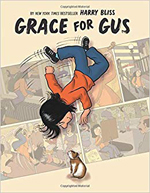 New York City provides the setting for this story about Grace, a young girl who wants to raise money to get a friend for the class guinea pig, Gus. One evening, Grace goes into the city to earn money by playing the violin on the subway platform, drawing caricatures on Fifth Avenue, and dancing on a train. Bliss captures the diverse population of the city through vibrant illustrations, which include visual nods to other comic book characters and famous people and sight gags, that make this nearly wordless picture book in graphic novel format fun to read. It’s a treat to go along with Grace as she goes into the city, working to get a buddy for Gus.
New York City provides the setting for this story about Grace, a young girl who wants to raise money to get a friend for the class guinea pig, Gus. One evening, Grace goes into the city to earn money by playing the violin on the subway platform, drawing caricatures on Fifth Avenue, and dancing on a train. Bliss captures the diverse population of the city through vibrant illustrations, which include visual nods to other comic book characters and famous people and sight gags, that make this nearly wordless picture book in graphic novel format fun to read. It’s a treat to go along with Grace as she goes into the city, working to get a buddy for Gus.
—CT
Macanudo: Olga Rules! (Macanudo #4). Liniers. Trans. Mara Faye Lethem. 2018. Enchanted Lion.
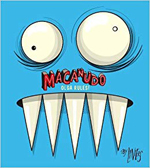 Since 2002, Liniers has been writing “Macanudo,” a popular daily comic strip in La Nación, a leading Argentina newspaper. This latest collection of Liniers’ imaginative and sometimes surreal comics features Olga, the big-eyed, toothy, blue imaginary friend of a young boy named Martin. There are also comics about other favorite characters (introduced in the first three volumes of the Macanudo series), including the young girl Henrietta; Fellini, her cat; Mandelbaum, her teddy bear; Oliverio, the olive; and the Mysterious Man in Black. These comics, which are both entertaining and thought-provoking, will induce chuckles from readers of all ages.
Since 2002, Liniers has been writing “Macanudo,” a popular daily comic strip in La Nación, a leading Argentina newspaper. This latest collection of Liniers’ imaginative and sometimes surreal comics features Olga, the big-eyed, toothy, blue imaginary friend of a young boy named Martin. There are also comics about other favorite characters (introduced in the first three volumes of the Macanudo series), including the young girl Henrietta; Fellini, her cat; Mandelbaum, her teddy bear; Oliverio, the olive; and the Mysterious Man in Black. These comics, which are both entertaining and thought-provoking, will induce chuckles from readers of all ages.
—CA
The Party and Other Stories (Fox + Chick #1). Sergio Ruzzier. 2018. Chronicle.
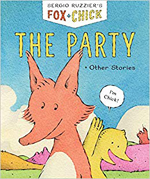 Sergio Ruzzier introduces young readers to best friends Fox and Chick in three humorous short stories. In “The Party,” Chick disrupts Fox’s reading by knocking at his door, asking to use his bathroom, and then proceeding to use it to have a party with his friends. In “Good Soup,” Chick learns that it’s a good thing that Fox loves to eat vegetable soup rather than small animals such as squirrels, lizards—and little birds. In “Sit Still,” Chick comes along while Fox is painting a landscape and begs to have his portrait painted. Of course, Chick can’t sit still long enough. The cheerful pastel ink and watercolor illustrations and simple, repetitive text presented entirely in dialogue balloons make this book a good choice for newly independent readers.
Sergio Ruzzier introduces young readers to best friends Fox and Chick in three humorous short stories. In “The Party,” Chick disrupts Fox’s reading by knocking at his door, asking to use his bathroom, and then proceeding to use it to have a party with his friends. In “Good Soup,” Chick learns that it’s a good thing that Fox loves to eat vegetable soup rather than small animals such as squirrels, lizards—and little birds. In “Sit Still,” Chick comes along while Fox is painting a landscape and begs to have his portrait painted. Of course, Chick can’t sit still long enough. The cheerful pastel ink and watercolor illustrations and simple, repetitive text presented entirely in dialogue balloons make this book a good choice for newly independent readers.
—CA
A Tale of Two Sloths (Peter & Ernesto #1). Graham Annable. 2018. First Second/Roaring Brook.
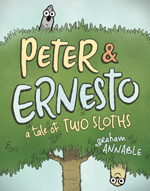 Peter and Ernesto, two sloths, live contently in a tree until a conversation ending with “nothing ever changes for you and me” makes Ernesto want to see what else is out there. Despite Peter’s hesitation, Ernesto heads out on an adventure to see “ALL of the sky.” On his journey, Ernesto meets animals who help him discover what other pieces of the sky look like when viewed from the ocean to the desert. Back in the tree, concerned for Ernesto, Peter decides to go after him, and sets out on an adventure of his own. After a series of animal encounters, Peter and Ernesto are reunited to share what they learned from their adventures. The natural color palette of Annable’s illustrations provides a realistic background for Peter and Ernesto’ tale. Young readers will enjoy the simple text and the humor of this book.
Peter and Ernesto, two sloths, live contently in a tree until a conversation ending with “nothing ever changes for you and me” makes Ernesto want to see what else is out there. Despite Peter’s hesitation, Ernesto heads out on an adventure to see “ALL of the sky.” On his journey, Ernesto meets animals who help him discover what other pieces of the sky look like when viewed from the ocean to the desert. Back in the tree, concerned for Ernesto, Peter decides to go after him, and sets out on an adventure of his own. After a series of animal encounters, Peter and Ernesto are reunited to share what they learned from their adventures. The natural color palette of Annable’s illustrations provides a realistic background for Peter and Ernesto’ tale. Young readers will enjoy the simple text and the humor of this book.
—CT
Ages 9–11
Akissi: Tales of Mischief (Akissi #2). Marguerite Abouet. Trans. Judith Taboy & Marie Bédrune. Ill. Mathieu Sapin. 2018. Flying Eye/Nobrow.
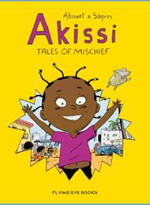 Akissi, a strong-willed little girl, gets into humorous situations in this collection of graphic short stories that reflect the author’s experiences growing up in the Ivory Coast. This aptly titled book, first published in France, is filled with Akissi’s day-to-day mini-adventures and some cautionary tales. For example, in “Tooth-Puller,” Akissi eats too many sweets and must go to the dentist, which turns into a scary adventure. The panels with colorful, expressive artwork and dialogue in speech bubbles make these stories easy to follow. With 21 six-page stories, it’s a book that can be enjoyed in one sitting or in small bursts. Bonus pages include recipes and instructions on how to make African braids.
Akissi, a strong-willed little girl, gets into humorous situations in this collection of graphic short stories that reflect the author’s experiences growing up in the Ivory Coast. This aptly titled book, first published in France, is filled with Akissi’s day-to-day mini-adventures and some cautionary tales. For example, in “Tooth-Puller,” Akissi eats too many sweets and must go to the dentist, which turns into a scary adventure. The panels with colorful, expressive artwork and dialogue in speech bubbles make these stories easy to follow. With 21 six-page stories, it’s a book that can be enjoyed in one sitting or in small bursts. Bonus pages include recipes and instructions on how to make African braids.
—CT
Be Prepared. Vera Brosgol. 2018. First Second/Roaring Brook.
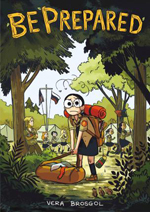 Nine-year-old Russian immigrant Vera, who has a hard time fitting in with her suburban classmates, looks forward to attending a summer camp where she is sure she’ll make friends—a camp for Russian American kids in the Connecticut woods. However, camp is not what she expected. Her cabinmates are mean, the toilets are smelly outhouses, and there’s too much marching, too many odd camp traditions, too many pesky insects and spiders, and too much Russian. Although camp is a big disappointment, Vera deals with it, trying to fit in but getting it all wrong. Readers should be prepared to laugh out loud as Vera Brosgol shares memories of her childhood experiences at Russian summer camp in this engaging graphic novel.
Nine-year-old Russian immigrant Vera, who has a hard time fitting in with her suburban classmates, looks forward to attending a summer camp where she is sure she’ll make friends—a camp for Russian American kids in the Connecticut woods. However, camp is not what she expected. Her cabinmates are mean, the toilets are smelly outhouses, and there’s too much marching, too many odd camp traditions, too many pesky insects and spiders, and too much Russian. Although camp is a big disappointment, Vera deals with it, trying to fit in but getting it all wrong. Readers should be prepared to laugh out loud as Vera Brosgol shares memories of her childhood experiences at Russian summer camp in this engaging graphic novel.
—CA
The Cardboard Kingdom. Chad Sell. 2018. Knopf/Random House.
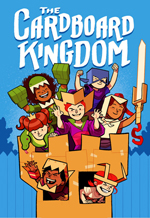 What do you get when you take a neighborhood full of resourceful kids, piles of discarded cardboard, and lots of imagination? The Cardboard Kingdom! In this delightful book, illustrated by Chad Sell and written by multiple authors, the reader is transported to a world where a prince is saved by a rogue, and a gentle cat is turned into a fierce dragon. A diverse neighborhood ensures that readers will relate to one or more characters. Sell uses subtle yet effective differences in illustration style to cue the reader as to which parts are real and which are imaginative. The expectation-defying kingdom inhabitants and their stories are woven together through chapters and in small vignettes. Will the Gargoyle keep his house safe from evil? Who will save Megolopolis from the Bully? A final adventure before school starts brings the kids together for a celebratory conclusion to a quest-filled summer.
What do you get when you take a neighborhood full of resourceful kids, piles of discarded cardboard, and lots of imagination? The Cardboard Kingdom! In this delightful book, illustrated by Chad Sell and written by multiple authors, the reader is transported to a world where a prince is saved by a rogue, and a gentle cat is turned into a fierce dragon. A diverse neighborhood ensures that readers will relate to one or more characters. Sell uses subtle yet effective differences in illustration style to cue the reader as to which parts are real and which are imaginative. The expectation-defying kingdom inhabitants and their stories are woven together through chapters and in small vignettes. Will the Gargoyle keep his house safe from evil? Who will save Megolopolis from the Bully? A final adventure before school starts brings the kids together for a celebratory conclusion to a quest-filled summer.
—CT
Ages 12–14
Illegal. Eoin Colfer & Andrew Donkin. Ill. Giovanni Rigano. 2018. Sourcebooks Jabberwocky/Sourcebooks.
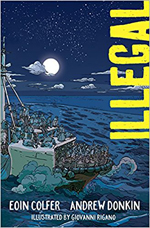 Illegal is an accessible exploration of the plight of illegal immigrants in the 21st century in graphic novel format. Orphaned 12-year-old Ebo makes a perilous journey from Ghana, crossing the Sahara Desert to Tripoli, Libya, where he eventually finds his brother, Kwame, who left, without a word, 19 months earlier. After earning funds to purchase a “ticket” on a boat, they set out to cross the Mediterranean Sea with the hope of locating their sister, Sisi, in Europe. Chapters shift between events at sea, from being adrift in an overcrowded dinghy to Ebo’s rescue by a search helicopter, and flashbacks of his trek across Africa. Ebo’s story ends in an Italian refugee camp, where although sad that Kwame did not survive, he is reunited with Sisi. Back matter includes a creator’s note providing a context for Illegal and “Journey: Helen’s Story,” a five-page comic adaptation of a true account of a refugee from Sudan.
Illegal is an accessible exploration of the plight of illegal immigrants in the 21st century in graphic novel format. Orphaned 12-year-old Ebo makes a perilous journey from Ghana, crossing the Sahara Desert to Tripoli, Libya, where he eventually finds his brother, Kwame, who left, without a word, 19 months earlier. After earning funds to purchase a “ticket” on a boat, they set out to cross the Mediterranean Sea with the hope of locating their sister, Sisi, in Europe. Chapters shift between events at sea, from being adrift in an overcrowded dinghy to Ebo’s rescue by a search helicopter, and flashbacks of his trek across Africa. Ebo’s story ends in an Italian refugee camp, where although sad that Kwame did not survive, he is reunited with Sisi. Back matter includes a creator’s note providing a context for Illegal and “Journey: Helen’s Story,” a five-page comic adaptation of a true account of a refugee from Sudan.
—CA
Scarlett Hart Monster Hunter. Marcus Sedgwick. Ill. Thomas Taylor. 2018. First Second/Roaring Brook.
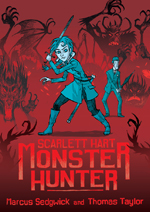 Scarlett Hart has taken over her parents’ monster hunting after they were killed, even though she is technically underage to be doing so. Unfortunately, the Count, also a monster hunter, uses every opportunity he can to take Scarlett’s catches away from her. Scarlett eventually finds out why the Count has it out for her and learns how he manages to be in the same place she is almost every time she finds monsters. The artwork, done in a dark color palette, captures the underground England setting. The panels clearly show small details of events and express the emotions of characters, which is especially helpful on the pages with little or no dialogue. Middle-grade readers will enjoy the action and the steampunk flavor of the book.
Scarlett Hart has taken over her parents’ monster hunting after they were killed, even though she is technically underage to be doing so. Unfortunately, the Count, also a monster hunter, uses every opportunity he can to take Scarlett’s catches away from her. Scarlett eventually finds out why the Count has it out for her and learns how he manages to be in the same place she is almost every time she finds monsters. The artwork, done in a dark color palette, captures the underground England setting. The panels clearly show small details of events and express the emotions of characters, which is especially helpful on the pages with little or no dialogue. Middle-grade readers will enjoy the action and the steampunk flavor of the book.
—CT
Ages 15+
I Am Gandhi: A Graphic Biography of a Hero (Ordinary People Change the World). Brad Meltzer. 2018. Dial/Penguin.
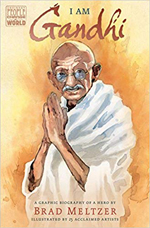 “Only united are we unstoppable.” Gandhi’s principles, accompanied by well-researched facts, are found throughout Brad Meltzer’s comprehensive biography of the peaceful activist Mahatma Gandhi. Twenty-five comic book illustrators bring this book (a version of Meltzer’s 2017 biography of Gandhi in his “I Am” series for younger readers) to life. Ghandi’s life story is told from his own point of view as well as from those of bystanders. Sometimes the characters interact with each other, and at other times, they face and seem to be speaking directly to the reader. Back matter includes quotes, a timeline, photos of Gandhi, sources, suggestions for further reading, information about Seeds of Peace (an organization the contributors feel “embodies Gandhi’s mission”), and biographical notes on contributors.
“Only united are we unstoppable.” Gandhi’s principles, accompanied by well-researched facts, are found throughout Brad Meltzer’s comprehensive biography of the peaceful activist Mahatma Gandhi. Twenty-five comic book illustrators bring this book (a version of Meltzer’s 2017 biography of Gandhi in his “I Am” series for younger readers) to life. Ghandi’s life story is told from his own point of view as well as from those of bystanders. Sometimes the characters interact with each other, and at other times, they face and seem to be speaking directly to the reader. Back matter includes quotes, a timeline, photos of Gandhi, sources, suggestions for further reading, information about Seeds of Peace (an organization the contributors feel “embodies Gandhi’s mission”), and biographical notes on contributors.
—CT
The Strange. Jérôme Ruillier. Trans. Helge Dascher. 2018. Drawn & Quarterly.
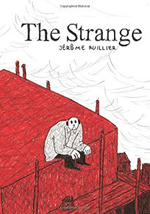 In his first book translated into English, Jérôme Ruiller (who was born in Madagascar and lives in France) tells the story of the journey of an undocumented immigrant. With a third-person narrative and paneled artwork of colored pencil drawings, Ruiller portrays the life of an unnamed oversized dog–person, one of “the stranges” in an unnamed country, from the points of view of individuals he encounters as he tries to adapt and survive in the city while under the constant threat of deportation. These individuals (animal–persons of various species) reflect a range of responses to the immigrant: indifference, fear, hostility, exploitation, kindness, and advocacy. The epilogue tells how he is put on a plane by authorities and returned to the country he left nine years earlier. This beautifully crafted graphic novel is realistic, universal, and timely.
In his first book translated into English, Jérôme Ruiller (who was born in Madagascar and lives in France) tells the story of the journey of an undocumented immigrant. With a third-person narrative and paneled artwork of colored pencil drawings, Ruiller portrays the life of an unnamed oversized dog–person, one of “the stranges” in an unnamed country, from the points of view of individuals he encounters as he tries to adapt and survive in the city while under the constant threat of deportation. These individuals (animal–persons of various species) reflect a range of responses to the immigrant: indifference, fear, hostility, exploitation, kindness, and advocacy. The epilogue tells how he is put on a plane by authorities and returned to the country he left nine years earlier. This beautifully crafted graphic novel is realistic, universal, and timely.
—CA
Carrie Thomas is a reading specialist at First Philadelphia Charter School. Previously, she was a public school music teacher and worked with non-profit administration and outreach. Carolyn Angus is former director of the George G. Stone Center for Children's Books, Claremont Graduate University, in Claremont, California.
These reviews are submitted by members of the International Literacy Association's Children's Literature and Reading Special Interest Group (CL/R SIG) and are published weekly on Literacy Daily.